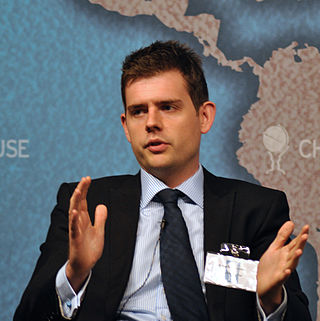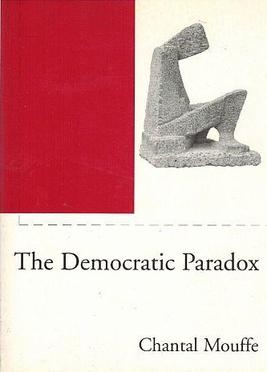Right-wing politics is the range of political ideologies that view certain social orders and hierarchies as inevitable, natural, normal, or desirable, typically supporting this position based on natural law, economics, authority, property, religion, biology, or tradition. Hierarchy and inequality may be seen as natural results of traditional social differences or competition in market economies.
Populism is a range of political stances that emphasize the idea of "the people" and often juxtapose this group with "the elite". It is frequently associated with anti-establishment and anti-political sentiment. The term developed in the late 19th century and has been applied to various politicians, parties and movements since that time, often as a pejorative. Within political science and other social sciences, several different definitions of populism have been employed, with some scholars proposing that the term be rejected altogether.

Law and Justice is a right-wing populist and national-conservative political party in Poland. Its chairman is Jarosław Kaczyński.

Ernesto Laclau was an Argentine political theorist and philosopher. He is often described as an 'inventor' of post-Marxist political theory. He is well known for his collaborations with his long-term partner, Chantal Mouffe.

Chantal Mouffe is a Belgian political theorist, formerly teaching at University of Westminster. She is best known for her and Ernesto Laclau's contribution to the development of the so-called Essex School of discourse analysis. She is a strong critic of deliberative democracy and advocates a conflict-oriented model of radical democracy.

Verso Books is a left-wing publishing house based in London and New York City, founded in 1970 by the staff of New Left Review (NLR) and includes Tariq Ali and Perry Anderson on its board of directors. According to its website, it's the largest independent, radical publishing house in the English-speaking world, publishing one hundred books a year. Harper's called it "Anglo-America's preeminent radical press," and The Sunday Times called it "a rigorously intelligent publisher."
Agonism is a political and social theory that emphasizes the potentially positive aspects of certain forms of conflict. It accepts a permanent place for such conflict in the political sphere, but seeks to show how individuals might accept and channel this conflict positively. Agonists are especially concerned with debates about democracy, and the role that conflict plays in different conceptions of it. The agonistic tradition to democracy is often referred to as agonistic pluralism. A related political concept is that of countervailing power. Beyond the realm of the political, agonistic frameworks have similarly been utilized in broader cultural critiques of hegemony and domination, as well as in literary and science fiction.

Right-wing populism, also called right populism, is a political ideology that combines right-wing politics with populist rhetoric and themes. Its rhetoric employs anti-elitist sentiments, opposition to the Establishment, and speaking to or for the "common people". Recurring themes of right-wing populists include neo-nationalism, social conservatism, economic nationalism and fiscal conservatism. Frequently, they aim to defend a national culture, identity, and economy against perceived attacks by outsiders. Like all forms of populism, right-wing populism has associations with authoritarianism, while some far right-wing populists draw comparisons to fascism.
Radical democracy is a type of democracy that advocates the radical extension of equality and liberty. Radical democracy is concerned with a radical extension of equality and freedom, following the idea that democracy is an unfinished, inclusive, continuous and reflexive process.

Left-wing populism, also called social populism, is a political ideology that combines left-wing politics with populist rhetoric and themes. Its rhetoric often includes elements of anti-elitism, opposition to the Establishment, and speaking for the "common people". Recurring themes for left-wing populists include economic democracy, social justice, and skepticism of globalization. Socialist theory plays a lesser role than in traditional left-wing ideologies.

Matthew James Goodwin is a British political scientist and former academic whose last academic post was as professor of politics in the School of Politics and International Relations at the University of Kent, which he held from 2015 to 2024. His publications include National Populism: The Revolt Against Liberal Democracy and Values, Voice and Virtue: The New British Politics. From September 2022 to 2023, he served on the Social Mobility Commission.
Post-politics in social sciences is a term used, along with similar terms "post-democracy" and post-political, to describe the effects of depoliticisation in the late 20th and early 21st centuries. Arguably, the representative democracies at this time had already entered the era of depoliticisation and post-politics. The term "post-politics" carries negative connotations of depriving electorate from voting on issues deemed settled by the elites, "depoliticisation" is neutral.
The Essex School of discourse analysis, or simply 'The Essex School', refers to a type of scholarship founded on the works of Ernesto Laclau and Chantal Mouffe. It focuses predominantly on the political discourses of late modernity utilising discourse analysis, as well as post-structuralist and psychoanalytic theory, such as may be found in the works of Lacan, Foucault, Barthes, and Derrida. Discourse analysis, according to its own terms at least, seeks to "unfix and destabilise" the accepted meanings of everyday language, and to reveal how the dominant discourse "marginalises and oppresses... equally valid claims to the question of how power could and should be exercised."

The Democratic Paradox is a collection of essays by the Belgian political theorist Chantal Mouffe, published in 2000 by Verso Books. The essays offer further discussion of the concept of radical democracy that Mouffe explored in Hegemony and Socialist Strategy, co-authored by Ernesto Laclau. In this collection, Mouffe deals with the specific conflicts between the post-Marxist democratic theory that she and Laclau theorized in Hegemony and Socialist Strategy and the competing democratic theories proposed by Jürgen Habermas and John Rawls. Verso's UK blog characterizes The Democratic Paradox as Mouffe's most accessible review of her perspectives on radical democracy.

The Radical Party of Oleh Liashko, formerly known as the Ukrainian Radical-Democratic Party, is a political party in Ukraine. It was registered in September 2010. It was primarily known for its radical populism, especially in 2014, when it had its largest amount of support.
Centrism is the range of political ideologies that exist between left-wing politics and right-wing politics on the left–right political spectrum. It is associated with moderate politics, including people who strongly support moderate policies and people who are not strongly aligned with left-wing or right-wing policies. Centrism is commonly associated with liberalism, radical centrism, and agrarianism. Those who identify as centrist support gradual political change, often through a welfare state with moderate redistributive policies. Though its placement is widely accepted in political science, radical groups that oppose centrist ideologies may sometimes describe them as leftist or rightist.
Post-Marxism is a perspective in critical social theory which radically reinterprets Marxism, countering its association with economism, historical determinism, anti-humanism, and class reductionism, whilst remaining committed to the construction of socialism. Most notably, Post-Marxists are anti-essentialist, rejecting the primacy of class struggle, and instead focus on building radical democracy. Post-Marxism can be considered a synthesis of post-structuralist frameworks and neo-Marxist analysis, in response to the decline of the New Left after the protests of 1968. In a broader sense, post-Marxism can refer to Marxists or Marxian-adjacent theories which break with the old worker's movements and socialist states entirely, in a similar sense to post-Leftism, and accept that the era of mass revolution premised on the Fordist worker is potentially over.

The Confederation Liberty and Independence, frequently shortened to just Confederation, is a far-right political alliance in Poland. It was initially founded in 2018 as a political coalition for the 2019 European Parliament election in Poland, although it was later expanded into a political party in order to circumvent the 8% vote threshold for coalitions to enter the national parliament. It won 11 seats in the Sejm after the 2019 Polish parliamentary election. Its candidate for the 2020 Polish presidential election was Krzysztof Bosak, who placed fourth among eleven candidates.
National Populism: The Revolt Against Liberal Democracy is a 2018 book by political scientists Roger Eatwell and Matthew Goodwin, published by Pelican Books. The book attempts to explain the success of national populist movements using a what the authors call a 4D model, with four variables: destruction of the national culture caused by large-scale immigration; deprivation of opportunities because of globalization and frequent disruptions and slow growth in the post-industrial economy; growing distrust amongst rural and working-class voters, who increasingly feel alienated by liberal, cosmopolitan, urban-inhabiting media and political elites; and de-alignment from traditional political-ideological allegiances, witnessed in high levels of voter volatility, or people switching party support between elections.










